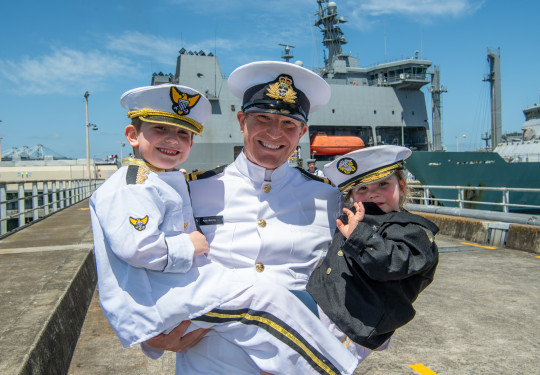Opening up when it's time to come home
For personnel deployed for several months, a Defence Force psychologist will meet with them before they get home.
22 February, 2024
In December HMNZS Aotearoa returned to New Zealand after a five-month deployment to South East Asia. Joining them for the final leg from Sydney to Auckland was Lieutenant Commander Ryan Hissong, Navy psychologist. It’s his job, working with another psychologist, to conduct individual Return to New Zealand Debriefs with each member of the crew.
His role is across all services, not just Navy. He could just as easily be talking to NZ Army personnel returning from a significant land deployment.
It’s a chance for personnel to reflect on the job they’ve done and open up if they want to, he says.
“What have they learned about themselves? Learned about the job? What have they taken away from the experience? What are they struggling with? Are they able to step away from the deployment, draw a line in the sand, decompress? Do they need support? How is the family?”
Following the sessions, it’s the psychologist’s job to provide a back-brief to Heads of Department and Command. “We give them some high-level themes, so they can use it to inform their practice and management.”
It can be a common perception that land-based missions are the harder, grander deployments. “But the realities of maritime deployments are that you’re operational all the time. It’s a different world out there, you’re isolated and if you’re not asleep you’re probably working – and perhaps not sleeping as much. It’s a high-demand workplace. You’ve got all these diverse people in a floating city, with all that complexity and the interpersonal dynamics that result. And then there’s the cumulative effect on families back home.”
Unlike a land-based deployment, the sailors go back to their mission after the session. “They’re not quite back yet.” And private spaces in a ship can be tricky to secure. “I was very grateful to the command team. Prioritising space for us reflects the importance they place on the process.”
He says it is an amazing service offered to Defence Force personnel. “It’s no secret that historically militaries haven’t done a great job looking after people coming home from deployments. But the fact that New Zealand does this is one reason why I’m in the Defence Force.”
LTCDR Hissong, who is originally from New York State, is new to the Navy, joining in mid-2022. He worked as a behavioural psychologist in New Zealand for many years, in the health and disability space. Increasingly frustrated with the challenges and limitations in his work, he took an interest in organisational psychology. “For me it’s all about building systems that set people up for success. That is, to perform at their best, but also to work sustainably. And the best place to practise that is in the Defence Force.”
He met the former Navy head of psychology at a recruitment event and it went from there. He was in the Junior Officer Common Training (JOCT) intake 22/02 and graduated in December 2022.
“I never thought this was a possibility at this stage in my life,” he says.
“Is it crazy for a guy pushing 40, with two kids at home, to do JOCT? My partner and I have a two-year-old and a four-year-old. At the time the youngest was only six months. I think my partner thought I was out of my mind initially, but over time she began to see the value behind it and I’m very grateful for her support to take a chance on something different. It’s been one of the best decisions we’ve ever made!”
The Defence Force definitely ticked all the boxes in terms of his profession. “There’s a wide variety of different psychological tasks you can do in the Defence Force, much broader than other roles in psychology. There’s also a lot of other cool stuff you get to do in this job, like travel, damage control and firing a MARS-L rifle. It was a bit of an adventure. The other thing was, I grew up playing ice hockey and my first career was as a professional ice hockey referee. I really missed that high performance aspect of my life.”
He has been the Head of Navy Psychology since December.
He says it is a real privilege to sit with sailors, soldiers and aviators and hear their stories. “We hear all the associated experiences, challenges, triumphs and everything in between, some of which they might not even share with their crewmates or whānau.”
Psychologists also deliver pre-deployment briefs, which could involve a family night to explain what to expect with their loved ones being away.
“I often reflect on how incredible of a commitment it is, and the associated sacrifices that these people make for our country - what a unique privilege it is to be keepers of all these stories and be able to support those that do so much for everyone else.”
